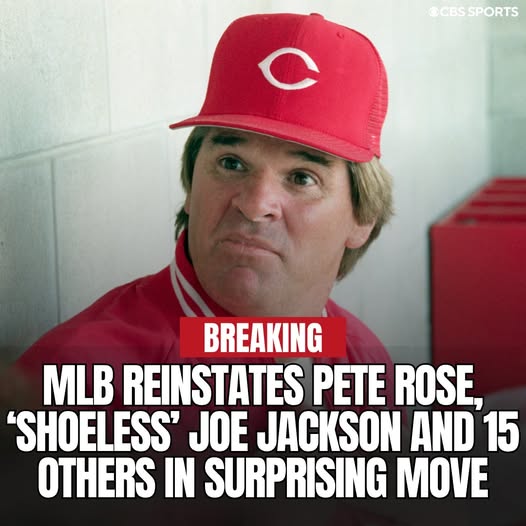In a move that reverberated across the baseball world and beyond, Major League Baseball has officially reinstated Pete Rose, lifting the lifetime ban that has kept one of the game’s most iconic — and controversial — figures in the shadows for more than three decades. Along with Rose, MLB also restored the statuses of several other individuals who had been barred under various circumstances over the years. It marks a monumental moment in baseball history, one steeped in reflection, redemption, and perhaps, reconciliation.
For years, the story of Pete Rose has served as both a cautionary tale and a lightning rod for debate. The all-time hits leader — with 4,256 to his name — Rose was a symbol of unrelenting hustle, unmatched competitiveness, and undying devotion to the game. Nicknamed “Charlie Hustle” for his head-first slides and all-out effort, Rose was the beating heart of the Cincinnati Reds’ “Big Red Machine,” a 17-time All-Star, a three-time World Series champion, and a player-manager who left everything he had on the field.
But all of that was rendered irrelevant in the eyes of Major League Baseball in 1989, when then-Commissioner A. Bartlett Giamatti issued a permanent ban after an investigation revealed that Rose had bet on games while managing the Reds — including on his own team. Though Rose denied the accusations for years, he eventually admitted to betting on baseball in a 2004 autobiography. Still, the damage was done. The Hall of Fame doors were locked. His name became synonymous not with greatness, but with scandal. The league treated his presence as a stain, not a celebration.
Now, after decades of shifting public opinion, relentless campaigning, and changing cultural attitudes toward gambling, MLB has made the decision to lift the ban. In an official statement, Commissioner Rob Manfred acknowledged that while Rose’s actions were a violation of Rule 21 — the sport’s long-standing ban on betting — the context of the modern era, combined with Rose’s own efforts to seek redemption, warranted a reevaluation.
“Pete Rose’s contributions to the game of baseball are undeniable,” Manfred stated. “While his transgressions cannot and should not be forgotten, we also believe that the time has come to honor the full scope of his impact on the game.”
Indeed, it’s not just Rose’s numbers that stand tall — though they do, dwarfing even the most prolific hitters in history — but the example he set for work ethic and competitive spirit. For generations of fans, especially those who grew up watching him dive into first base on routine plays, Rose epitomized what it meant to care. His reinstatement is a long-overdue acknowledgment that his flaws, while serious, do not erase the joy, excitement, and excellence he brought to the game.
But the decision also comes at a time when baseball has undergone seismic cultural changes. The league now has official partnerships with major sportsbooks. Gambling, once seen as an existential threat to the integrity of the sport, is now part of the fabric of the industry. From in-stadium betting lounges to live betting odds shown during broadcasts, the sport has not only embraced gambling — it profits from it. In this new reality, the idea of keeping Rose in the wilderness seems not only harsh but hypocritical.
For Rose, the news was met with emotion and humility. In a brief public statement, the 83-year-old said, “I’ve waited a long time for this moment. I want to thank Major League Baseball for giving me another chance to be part of the game I’ve loved all my life. I know I made mistakes, and I’ve lived with them every day. But I never stopped loving baseball. Today, I feel like I can finally come home.”
Indeed, the notion of “coming home” is deeply poignant. Rose has been an exile in plain sight — present at ballparks, autograph signings, and interviews, yet never officially embraced by the sport he helped define. With his reinstatement, a new chapter opens. Whether that includes induction into the Baseball Hall of Fame remains uncertain. While reinstatement lifts the official ban, it will ultimately be up to the Baseball Writers’ Association of America to vote him in. Still, the path is now clear.
Rose was not alone in the league’s sweeping act of reconciliation. Several other figures, including former executives and scouts banned for reasons ranging from gambling to rules violations, have also been reinstated. Though none command the same attention or hold the same cultural gravity as Rose, their inclusion speaks to MLB’s broader intent to reset its historical ledger. This is not just about Pete Rose — it’s about acknowledging the complexity of baseball’s past, and making peace with it.
There will undoubtedly be critics of the decision. Some believe that the sanctity of the rules — especially Rule 21 — must be upheld without compromise. They argue that Rose’s actions, which threatened the integrity of the game, should permanently disqualify him from its honors. Others fear that this opens the door to moral relativism, where the lines between right and wrong in professional sports become too flexible. These concerns are not without merit. But they also overlook the human capacity for growth, forgiveness, and perspective.
After all, Pete Rose has not returned as a conquering hero. He has returned as a man who lived with consequences, who faced public scorn, and who accepted responsibility for his actions, even if it took longer than many wanted. His story is not one of unchecked redemption, but of reckoning. It is that rare thing in sports — a second chance that comes not because someone was perfect, but because they were imperfect and real.
More than anything, this decision brings closure to a decades-long debate that has polarized fans, pundits, and even players. It offers the chance for a healing process to begin — for the league, for Rose, and for generations of baseball fans who have had to wrestle with what it means to honor greatness in a flawed world.



